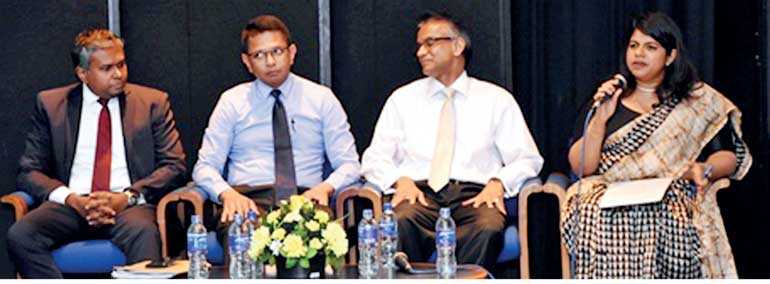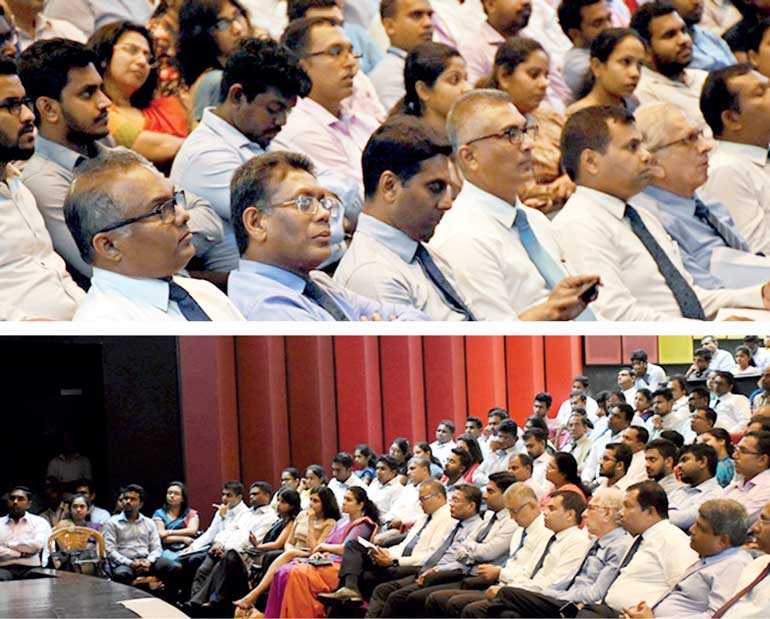Tuesday Feb 17, 2026
Tuesday Feb 17, 2026
Thursday, 9 August 2018 01:01 - - {{hitsCtrl.values.hits}}

The Association of Professional Bankers – Sri Lanka (APB) held the Second Bankers Evening Forum on Monday, 25 June with an inspiring panel discussion on an emerging topic on ‘Anti Money Laundering & Know Your Customer’. The bankers need to keep a greater focus on the evolving topics as Anti Money Laundering and the Know Your Customer due to the escalating concerns arising from those areas in the day-to-day banking operations. This is essential in order to avoid any risks and maintain the reputation of banks without incurring any financial losses. 
Accordingly, this panel discussion focused on ‘Local/international Regulations pertaining to AML & KYC’, ‘International Best Practices on AML & KYC’ and ‘Challenges and Opportunities from AML & KYC regulations for local banks’ in the context of digital transformation currently taking place. The event was held at the BOC Head Office Auditorium and a great number of participants including bankers, professionals and special invitees attended the event.
This panel discussion was moderated by Manique Kiriella Bandara who is the Compliance Officer at National Development Bank PLC. The eminent panel consisted of Ayesh Ariyasinghe, Senior Assistant Director – Financial Intelligence Unit, Central Bank of Sri Lanka, Inam Cassim –Head of Compliance, Standard Chartered Bank, Colombo and Surein Rajakariar – Partner and Head of Audit for KPMG Sri Lanka.
The panel discussion was initiated by Manique Kiriella highlighting the fact that Sri Lanka has been spotted as one of the countries with Anti Money Laundering (AML) deficiencies. She pointed out that this is a red light for the bankers and will be a greater national risk for the country as a whole. Ayesh Ariyasinghe elaborated on ‘Local/international Regulations pertaining to AML & KYC’.
In his presentation, he highlighted the fact that anti Money Laundering has been identified as a key aspect in the financial industry worldwide. He mentioned that Sri Lanka is in the Grey list of Financial Action Task Force (FATF) and in the Black list in the EU. There’s an increasing threat from AML to most of the financial institutions around the world and new sanction regimes are in place with penalties for non-compliance of the AML to mitigate the risks arising. He emphasised that the board level of the banks need to place procedures for AML policies and review those regularly.
The operational level of the banks also has a countless duty on managing the risk from AML in monitoring the suspect transactions arising from banking transactions. Finally, in concluding the presentation, he mentioned that in order to reduce the risk arising from AML, all the banks including all the financial institutions need to take precautionary measures refining the Suspicious Transaction Reporting.
Inam Cassim spoke on ‘International Best Practices on AML & KYC’. He emphasised that ‘criminal proceeds of around $ 1.6 trillion flows through the financial system’ which shows that bankers need to be more vigilant in executing transactions through the financial system pipeline. Inam introduced the Standard Chartered Bank’s directive towards managing the AML. The bank has financial crimes prevention from the Board Level and it has set out a framework to assess the risk in the portfolio. The product risk assessment, client risk assessment, country risk assessment, governance and reporting structures are checked to ensure the risk is within the risk appetite of the bank. According to Inam, the bank has also introduced a new decision tool to assess the clients called, E-CDD (Electronic Customer Due Diligence) as well. Overall presentation was well observed by all the participants as they all are involved in handling the transactions related to clients daily.
Surein Rajakarier spoke on the ‘Challenges and Opportunities from AML & KYC regulations for local banks’. He emphasised on the new avenue of banking through the use of Fintechs, Crypto currency, Blockchain technology which are emerging and currently used by most of the international banks such as JP Morgan, Goldman Sachs, etc. According to Rajakarier the threat from these new innovative technologies are severe and it will have a huge impact on the current banking operations. There is a threat on the confidential data and the privacy of data since there is no owner of the data transmitted through the Blockchain technology. The ability to manipulate the data and corrupt the sensitive data is a major concern within the banks.

Finally, he also highlighted the importance of AML independent audit and focusing on AML and KYC in conducting day to day banking operations. According to him AML audits should focus on assessment of the procedures available to check the money laundering activities, risk management, Customer Due diligence (CDD), detecting and reporting suspicious transactions and record keeping and retention.
Finally, the moderator Manique Kiriella, along with the panel, opened up the forum to answer the questions raised by the audience. The questions were mainly on the innovative banking technologies. Ayesh Ariyasinghe stated that currently no infrastructure is available in our country to execute the blockchain technology. He highlighted the importance of the customer on boarding process to minimise the risks at the first sight. Inam and Rajakariar also expressed their own view points on the balancing of profit maximisation and the investment on AML & KYC.